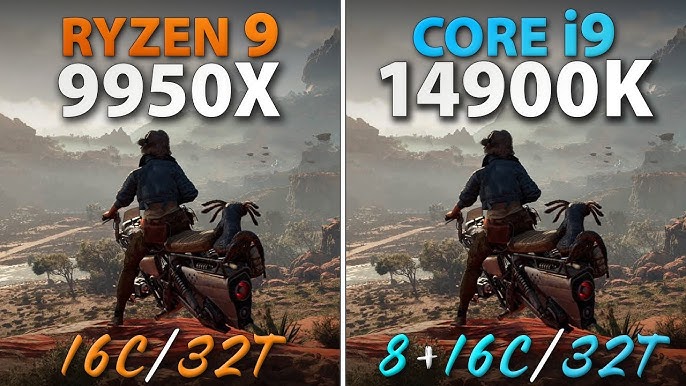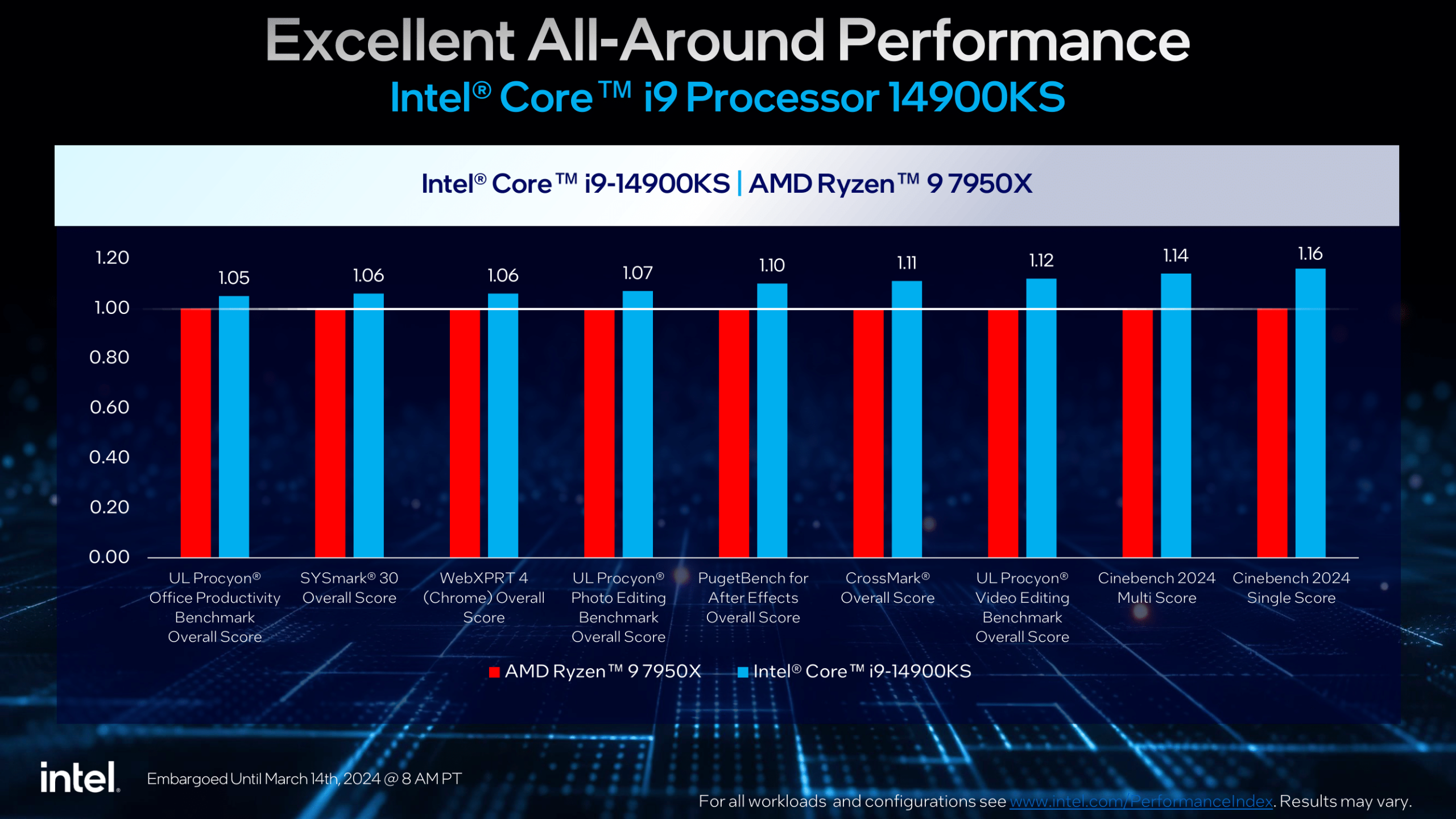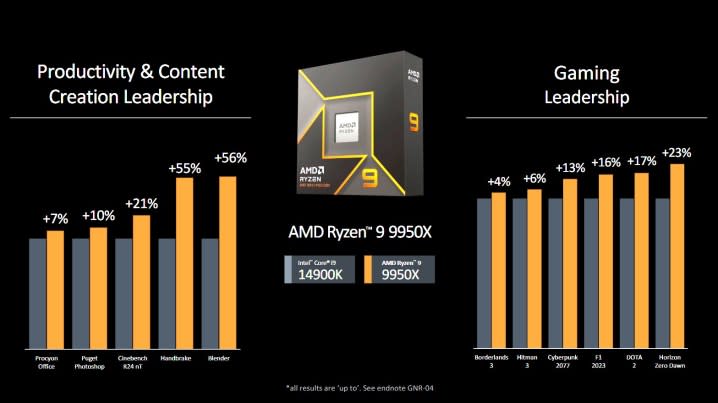The battle between Intel and AMD continues with the release of the Intel Core i9-14900K and the AMD Ryzen 9 9950X, two of the most powerful desktop processors available today. This detailed comparison explores their performance metrics, architecture differences, gaming capabilities, productivity benchmarks, thermals, and overall value—providing an in-depth guide for enthusiasts, gamers, and professionals looking to invest in the best high-end CPU.

Architectural Overview: Intel Raptor Lake Refresh vs AMD Zen 5
Intel Core i9-14900K (Raptor Lake Refresh)
-
Cores/Threads: 24 (8 P-Cores + 16 E-Cores) / 32 Threads
-
Base/Boost Clock: 3.2 GHz / Up to 6.0 GHz (Thermal Velocity Boost)
-
L2/L3 Cache: 32MB / 36MB
-
Socket: LGA 1700
-
TDP: 125W (Base) / Up to 253W (Turbo Power)
AMD Ryzen 9 9950X (Zen 5)
-
Cores/Threads: 16 Cores / 32 Threads
-
Base/Boost Clock: 4.3 GHz / Up to 5.7 GHz
-
L2/L3 Cache: 16MB / 64MB
-
Socket: AM5
-
TDP: 170W
The i9-14900K leverages a hybrid core architecture that excels in multitasking and gaming, while the Ryzen 9 9950X pushes performance through advanced IPC gains and high core efficiency under AMD’s Zen 5 platform.
Performance Benchmarks: Productivity & Multi-Core Workloads
Content Creation & Multithreaded Performance
| Test | Ryzen 9 9950X | Intel Core i9-14900K |
|---|---|---|
| Cinebench R23 Multi | 39,500+ | 38,200 |
| Blender Render (BMW) | 57 seconds | 64 seconds |
| Adobe Premiere Pro Export | ~4m 30s | ~5m 05s |
| 7-Zip Compression | Higher throughput | Slightly lower |
The Ryzen 9 9950X demonstrates clear advantages in multi-threaded workloads such as rendering and compression, owing to higher cache and more efficient core utilization. Intel holds up well but slightly trails in prolonged tasks due to thermal throttling under peak loads.
Gaming Performance: Frame Rates and Real-World Gameplay
| Game (1080p Ultra, RTX 4090) | Intel i9-14900K | Ryzen 9 9950X |
|---|---|---|
| Cyberpunk 2077 | 189 fps | 180 fps |
| Far Cry 6 | 210 fps | 205 fps |
| Call of Duty: MW3 | 253 fps | 247 fps |
| Starfield | 122 fps | 130 fps |
Intel’s i9-14900K edges ahead in titles that favor single-threaded performance due to its aggressive clock speeds, particularly in legacy or CPU-bound games. However, the Ryzen 9 9950X closes the gap and sometimes surpasses Intel in newer games optimized for multithreaded execution.
Power Efficiency and Thermals
The Ryzen 9 9950X exhibits better power-to-performance ratios, operating more efficiently at a lower wattage than the i9-14900K, which often hits higher thermal loads under sustained stress.
Thermal and Power Characteristics
-
Ryzen 9 9950X: Peak temps ~88°C with a 280mm AIO
-
i9-14900K: Peaks at 100°C under load, even with high-end cooling
-
Power Draw (Full Load): Ryzen ~170W vs Intel ~253W
AMD maintains a notable lead in thermal control and efficiency, making the Ryzen chip a more balanced choice for compact systems or noise-sensitive environments.
Platform Features and Future-Proofing
| Feature | Intel Core i9-14900K | AMD Ryzen 9 9950X |
|---|---|---|
| PCIe Version | Gen 5.0 | Gen 5.0 |
| Memory Support | DDR5-5600 / DDR4 | DDR5-6000+ only |
| Motherboard Support | LGA1700 (Z690, Z790) | AM5 (X670E, B650) |
| Upgrade Path | Limited (Last LGA1700 CPU) | Extended AM5 support through 2027+ |
The Ryzen 9 9950X benefits from AMD’s long-term support strategy for AM5, while Intel’s 14900K marks the end of the LGA 1700 platform lifecycle. This makes AMD the more future-proof option for users planning to upgrade over time.
Overclocking and Tuning Potential
-
Intel i9-14900K: Allows fine-grained per-core tuning, though thermal headroom is limited. Overclocking potential is high, but power usage spikes accordingly.
-
Ryzen 9 9950X: Offers Precision Boost Overdrive (PBO) and Curve Optimizer, which intelligently scale performance without manual overclocking.
AMD’s silicon tuning is easier and more thermally sustainable, whereas Intel still caters to enthusiasts looking for extreme manual control.
Price-to-Performance Ratio
| Model | MSRP (USD) | Average Retail Price | Performance per Dollar |
|---|---|---|---|
| Ryzen 9 9950X | $699 | ~$679 | Excellent |
| Core i9-14900K | $589 | ~$599 | Very Good |
While Intel provides strong gaming performance at a slightly lower entry price, AMD’s superior productivity performance and long-term platform value justify the premium for power users.
Which Flagship Processor Should You Choose?
Choose the Intel Core i9-14900K if:
-
Your primary focus is gaming, especially competitive or CPU-bound titles.
-
You want compatibility with DDR4 memory and an existing LGA 1700 motherboard.
-
You plan to overclock and don’t mind managing higher thermals.
Choose the AMD Ryzen 9 9950X if:
-
You require best-in-class performance for creative or professional workloads.
-
You prioritize power efficiency and quieter operation.
-
You seek long-term platform stability with future CPU upgrade paths.
In conclusion, the AMD Ryzen 9 9950X is the superior choice for users seeking all-around performance, efficiency, and longevity, while the Intel Core i9-14900K remains a compelling option for elite gaming with blazing-fast single-core speeds.




